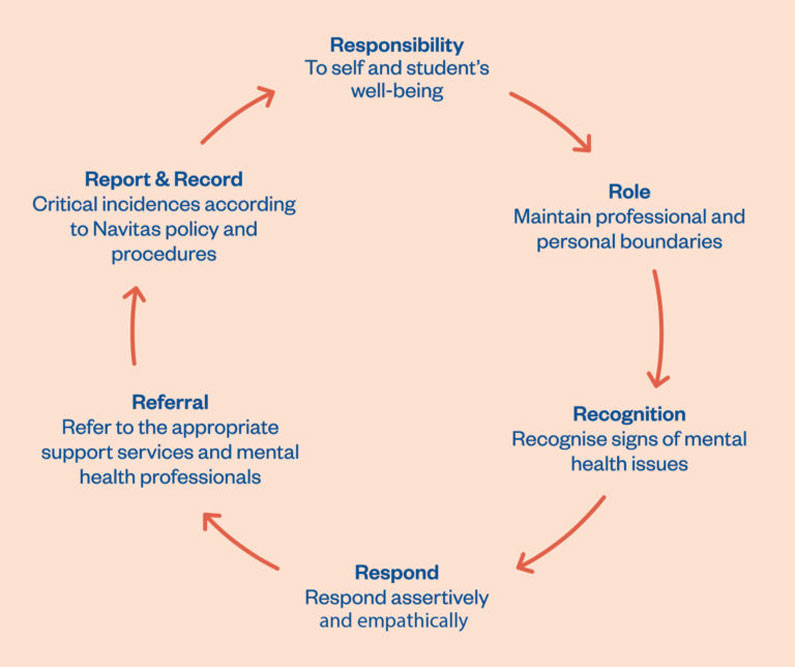The accidental counsellor

Jorani, a 17 year old Cambodian student, was excited to start her ELICOS foundation program in Australia. Initially, she arrived early to class and was conscientious about her work. But recently, her teacher noticed she often sat alone in the breaks, was sometimes excluded from group work, and has come to class crying. She disclosed her host family made no effort to talk to her, and she missed her own family deeply.
Sadly, this experience can be all too common for international students, and it can have a lasting impact on their mental health and their social, education and employment outcomes.
Student support services staff and teachers may be the first to see signs of increased stress levels, or emotional reactions that could indicate a deeper mental health concern. Early intervention and prevention is vital. We want to make sure staff have the awareness, skills and knowledge to manage these situations within the context and professional boundary of their work role. This involves recognising the signs of mental ill-health, responding appropriately and immediately, and referring students to professional counsellors and/or support services.
International students now comprise over 30% of enrolments in Higher Education institutions in Australia. The majority of these students are aged between 18 to 24, a time when the onset of mental health issues peak.
English Australia’s 2017 survey of 95 ELT colleges found that 40% of their staff had spoken with students who had suicidal thoughts, and more than half believed mental health issues had increased in the previous two years.

International students are vulnerable
The commencement of tertiary studies for any student is often challenging as they adjust to the academic environment and workload, gain financial and personal independence and learn basic life skills. International students, displaced from their own cultures, families and support networks, are particularly vulnerable and often face additional challenges:
- Life skills – For many it is their first time living away from home and they may not have the confidence or capacity to manage independent living.
- Language barriers – particularly for ELICOS students with limited English or students enrolled in Foundation Studies, it can be difficult for them to explain how they feel. Access to an affordable counsellor who speaks their native language is not always available.
- Academic expectations and practices – many are unused to being asked to think critically and independently, and being questioned in class can feel confronting.
- Cultural differences – some may perceive mental health as a ‘stigma’ and choose to hide their condition to ‘save face’ and not “bring shame” to their families.
- Parental pressures – They may face parental pressure to succeed in their studies – so a poor test result can heighten their anxiety.
- Homesickness – they miss the familiar smells, foods and sounds of home, as well as family and friends. Culture shock can lead to feelings of confusion, anxiety and isolation.
- Medical service costs – some overseas student health cover may place restrictions on mental health service access. Australia’s Medicare and GP system is unfamiliar and can be confusing to navigate.
- Visa compliance – international students need to progress satisfactorily with a full-time study load, and any absences may impact their visa.
ACAP Bespoke Training Programs
The Australian College of Applied Psychology (ACAP) is currently piloting training programs for Navitas’ La Trobe and Griffith Colleges, to help its lecturers and support staff understand their role as an ‘accidental counsellor’ for students such as Jorani.
Recognise, respond and refer
The ACAP training program is designed to help teachers and support staff recognise the signs of mental health issues, respond appropriately with ‘mental health first aid’, and ensure the student gets the ongoing professional support they need.
Each session is tailored to the specific needs of the Institution – Griffith College, for example, also wanted to learn how to better manage mental health issues for both domestic and international students due to their equal numbers. Case studies are adapted to reflect the cohort of students and previous scenarios experienced by teachers.
Through case studies, discussions and role plays, the participants learn best practice strategies to common situations – such as how to support a student who is having a panic attack, or how to recognise behavioural signs of depression, self-harm or suicide risk. The program also covers issues such as professional boundaries, duty of care, privacy of personal information, critical incident reporting, and accessing mental health support services and resources.
Initial responses from participants have been overwhelmingly positive, as they feel a pastoral care responsibility for their students. One told us “I liked the level of detail about how to help someone with anxiety, such as grounding and bringing them back to the present, and learning what to say (or not to say) to someone experiencing depression. It was extremely useful.”
Partnership for positive mental wellbeing
As part of the Navitas Group and a specialist Registered Training Provider in this field, ACAP is in a unique position to understand best practice counselling for international students, as well as the demands on student support staff and teachers.
ACAP also runs the successful Student Counselling Placement Program with Navitas’ SAE Creative Media Institute, providing practical experience for final year ACAP students by offering free counselling to creative media students. Now in its fourth year, the service is seen as a significant contributor to student success.
We see the Accidental Counsellor training as an important step in supporting mental wellbeing amongst Navitas’ university partner colleges, however it needs to be more than a one-off session.
Consistent policies and processes, as well as improved pre-admission preparation for students will also help to ensure students access the services they need sooner, rather than later.